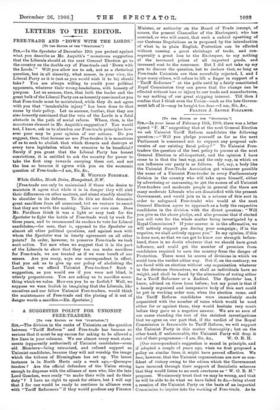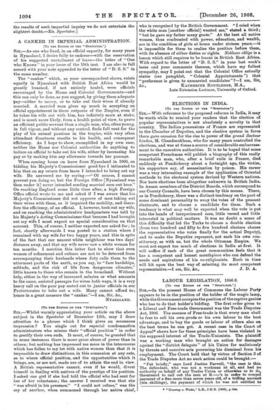[To TEl EDITOR OF VIII "SPROTATOL1
SrE,—In your issue of February 15th, 1908, there was a letter signed "F. M." suggesting that at the next General Election we ask Unionist Tariff Reform candidates the following question :—" Will you pledge yourself as far as the next Parliament is concerned not to support any proposal sub- versive of our existing fiscal policy ? " To Unionist Free- traders the question of the best policy to pursue at the next General Election is all-important, and the opinion I have come to is that the best way, and the only way, in which we can influence our party is as follows. Let, say, a body like the Unionist Free-Trade Association get whenever possible the name of a Unionist Free-trader in every Parliamentary division in the country who will take upon himself, either by advertising or canvassing, to get the names of all Unionist Free-traders and moderate people in general (for there are many moderate Liberals who are dissatisfied with the present Government, and would join us in a scheme of this sort in order to safeguard Free-trade) who would at the next General Election agree to approach as a body the respective candidates in the division with the direct question: "Will you give us the above pledge, and also promise that if elected you will vote for the whole matter being investigated by a Royal Commission ? If your answer is in the affirmative, we will actively support you during your campaign ; if in the negative, we shall actively oppose you." In my opinion, if this is done now, so that we can get to know our strength before- hand, there is no doubt whatever that we should have great influence, and could get the number of promises from candidates required to save the country from the danger of Protection. There must be scores of divisions in which we could turn the verdict either way. But if, on the contrary, we are faced with an election without any organisation whatever in the divisions themselves, we shall as individuals have no weight, and shall be faced by the alternative of voting either for a Tariff Reformer or a Radical. The Spectator has, I know, advised on these hues before ; but my point is that if a loosely organised and inexpensive body of this sort could be put in working order now, when the election came, and the Tariff Reform candidates were immediately made acquainted with the number of votes which would be used either for or against them, they would hesitate very much before they gave us a negative answer. We are so sure of our cause standing the test of the strictest investigations that we agree on our part that, if the verdict of the Royal Commission is favourable to Tariff Reform, we will support the Unionist Party in this matter thoroughly ; but on the other hand, if unfavourable, the Unionist Party will drop it
out of their programme.—I am, Sir, &a., W. 0. R. H.
[Our correspondent's suggestion is sound in principle, and if adopted a couple of years ago, when we first proposed a policy on similar lines, it might have proved effective. We fear, however, that the Unionist organisations are now so con- fident of victory owing to the odium which the Government have incurred through their support of Socialistic schemes that they would listen to no such overtures as " W. 0. R. H." proposes. We sincerely trust that we may be wrong, and that he will be able to do what we have failed to do,—bring about a reunion of the Unionist Party on the basis of an impartial Commission to inquire into the working of Free-trade. As to the results of such impartial inquiry we do not entertain the slightest doubt.—En. Spectator.]







































 Previous page
Previous page